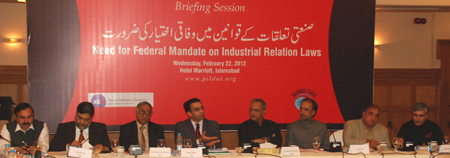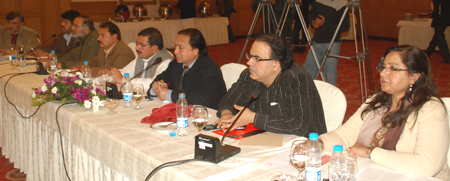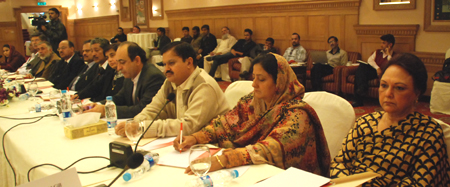|
|
| |
| EVENTS |
|
|
> �Issue of Federal legislation on Industrial Relations Laws will be sorted out before lapse of Industrial Relation Ordinance 2011:� Kaira
|
|
|
| |
Islamabad; February 22, At a PILDAT Briefing Session on Need for Federal Mandate on Industrial Relation Laws, Mr. Qamar Zaman Kaira, MNA (NA 106, Gujrat III, Punjab, PPPP), Secretary Information, PPP assured participants that the issue of industrial relation laws will be solved before the lapse of Industrial Relations Ordinance 2011. He indicated that the National Assembly session could be called for promulgation of such Law before its expected expiration on March 17, 2012. |
|
| |
Key Speakers at the session included Mr. Qamar Zaman Kaira, MNA, (NA 106, Gujrat-III, PPPP), Syed Haider Abbas Rizvi, MNA (NA 253, Karachi XV, Sindh, MQM), Deputy Parliamentary Leader MQM, Syed Sumsam Ali Bukhari, MNA (NA 145, Okara III, Punjab, PPPP), former Minister of State for Information, Mr. Tariq Fazal Chaudhry, MNA (NA 48, Islamabad II, PML-N), Mr. Riaz Fatiana, MNA (NA 94, Toba Tek Singh, Punjab, PML), Mr. Babar Sattar, Senior Lawyer, Mr. Zahoor Awan, General Secretary, Pakistan workers Federations and Mr. Ahmed Bilal Mehboob, Executive Director PILDAT. Parliamentarians from major political parties, representatives of workers and labour unions, media persons and select gathering of a civil society also participated in the session.
|
|
| |
�This issue is not that simple to sort out,� said Syed Haider Abbas Rizvi, MNA. There are three views about 18th Constitutional amendment, one is that it is harmful for national integrity while the 2nd point of view is that if someone raises his voice against the 18th amendment he is against provincial autonomy, but 3rd and valid reason is that whenever a huge constitutional amendment takes place it is followed by many small amendments in federal and provincial laws and regulations. He said that 18th amendment is a very well thought out idea, it is nothing but devolution and it is a continuous process. There should be a way to protect workers� rights without harming provincial autonomy. |
|
| |
Mr. Babar Sattar, while providing the legal and constitutional aspect, said that the state of Pakistan is under binding legal obligation to legislate for provision of labour rights under various international treaties for which only the Parliament is authorized to legislate. Furthermore, federal law is also needed for industries that fall within Federal areas and industries and unions that spread across two or more Provinces. Parliament is sovereign legislature which is not bound to any territory not the provincial legislature. He was of the view that the Parliament could simply promulgate a law for the above-stated purposes and in the event that the legality of such law is questioned, the courts could be appropriately assisted or the Provincial Assemblies explicitly delegate to the Federal Government the authority to legislate with regard to minimum standards for labour welfare and trans-province trade unions. He said that the object of the federal law should be delineated in such manner that it is not seen as undermining the devolutionary spirit of the 18th Amendment. |
|
| |
Mr. Riaz Fatiana, MNA said that we have to admit that we committed an error by not facilitating open debate on the 18th amendment in the House. Federal Government is responsible for international obligations so we can�t minimize the role of Federal Government in this regard. Human rights are fundamental right which could not be federal or provincial. |
|
| |
Syed Sumsam Ali Shah Bukhari, MNA believed that it is the credit of this Parliament that they reached a consensus on 18th amendment. Flaws can be there in the amendment and it would have been better if there were an open debate on it in Parliament but 99% of the amendment has a very positive impact. |
|
| |
Mr. Tariq Fazal Chaudhry, MNA, said that after 18th amendment there is a lot of ambiguity regarding Islamabad Capital Territory. For example the different departments of health are under 4 different ministries.
Ms. Fauzia Ejaz Khan, MNA, said that law should be made according to peoples need and these should be amended accordingly.
Mr. Zahoor Awan believed that if federal law is constituted on Industrial Relations it would not affect provincial autonomy. He said that issues of trade unionism, collective bargaining, workers� participation in management, and the harmonious resolution of employment disputes should be addressed through a federal legislation. He said that it was Quaid-e-Azam Muhammad Ali Jinnah who moved a bill in legislative Assembly of India on trade unions which became the Trade Union Act 1926. He said that after abolition of concurrent list and approval of 18th amendment all provincial Assemblies passed their own industrial relation acts which are only applied in their respective territories. He said that there are 7204 trade unions in 5214 orgnisations in the country, and except 370 orgnisations all other are registered under provincial laws. |
|
| |
Mr. Pevaiz Shaukat, President PFUJ, said that the PFUJ had sent written suggestion to the Parliamentary Committee on Constitutional Reforms but these were not accommodated. He said that the 18th amendment has destroyed labour unions. The future of Federal unions is hanging in the air at the moment.
Earlier Mr. Ahmed Bilal Mehboob, Executive Director PILDAT said that 18th amendment to the Constitution is a milestone in our Parliamentary history. As it has a huge impact and has introduced improvement in the Constitution, such a huge change bhas also brought some problems with it. Had this amendment been given some time for discussion in the Parliament, it would have been better and the problems we are facing today could have been minimized. There is no federal authority left which can regulate industrial relation laws or fulfill international obligations of the State. |
|
| |
This Briefing Session was organized with the support of Solidarity Centre and National Endowment for Democracy-NED. |
|
| |
|
|
| |

|
|
| |
|
|
| |

|
|
| |
|
|
| |

|
|
|
|
|
|
|
|
|